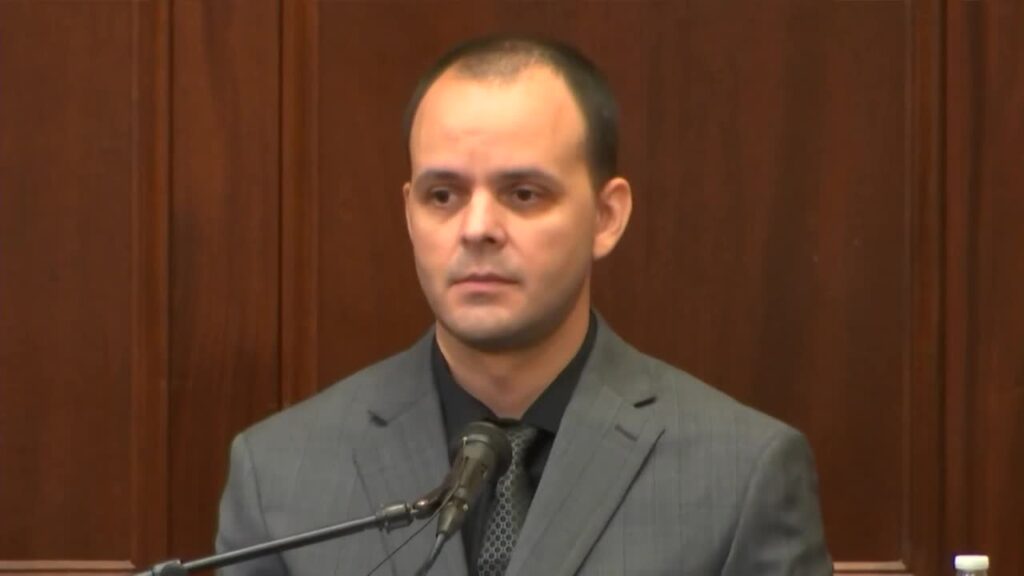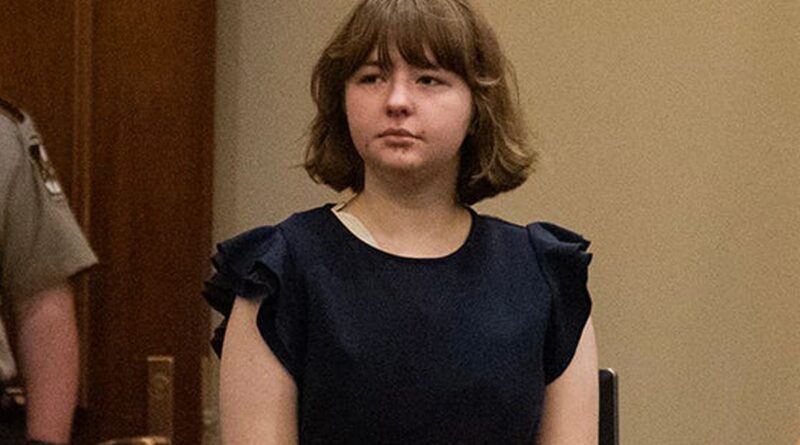Carly Gregg the 14-Year Old Who Killed Her Mother and Attempted to Kill Her Stepfather in Brandon Mississippi
On a quiet day in Brandon, Mississippi, a crime of unspeakable horror shattered the peace of a seemingly ordinary household. Carly Madison Gregg, a 14-year-old girl, brutally murdered her 40-year-old mother, Ashley Smylie, in their family home on March 19, 2024. The shocking violence didn’t end there. After taking her mother’s life, Carly invited a friend over to witness the aftermath, showing her mother’s lifeless body. Later, when her stepfather, Heath Smylie, returned home, Carly attempted to kill him as well. However, Heath was able to overpower her and call the police, narrowly escaping the same fate as his wife. This gruesome event has left the small community grappling with disbelief, trying to understand how such a young girl could commit such violent acts against the people closest to her.
The Family’s Background
To understand the unimaginable crime Carly Gregg committed, it’s important to examine the family dynamics that preceded the tragedy. Ashley Smylie was a 40-year-old mother, described by friends and neighbors as a dedicated parent trying to provide a stable home for her children. She had remarried and lived with her daughter Carly and her husband, Heath Smylie, in a suburban neighborhood in Brandon, Mississippi. The family, from the outside, appeared to lead a normal life. There were no immediate signs of distress or dysfunction that might foreshadow the violent events that would unfold within their home.
As Carly entered adolescence, the relationship between mother and daughter grew increasingly strained. Like many teenage girls, Carly was navigating the emotional turbulence that often accompanies adolescence. However, in Carly’s case, the tension seemed to reach dangerous levels. Reports suggest that Carly’s behavior had become more erratic in the months leading up to the murder. Whether this was the result of underlying mental health issues, family conflict, or a combination of factors remains unclear. What is certain is that the bond between Carly and her mother had deteriorated to a point where Carly felt an overwhelming rage towards Ashley Smylie.
While details about Carly’s school life and friendships have not been widely disclosed, the fact that she later involved a friend in the crime paints a troubling picture of her social and emotional state. It indicates a level of detachment from the consequences of her actions and suggests that Carly may have been grappling with deeper psychological issues.
Who Was Ashley Smylie?

Ashley Nicole Smylie was born on April 11, 1983, in Stuart, Florida, and remained a Floridian at heart throughout her life. She dedicated herself to education, working as a math teacher at Northwest Rankin High School in Mississippi, where she was highly regarded by both colleagues and students.
Ashley married Heath Smylie, and together they resided in Brandon, Mississippi. Heath, who became a father figure to Ashley’s daughter, Carly, testified about the close relationship they shared, describing Carly as a “sweet little girl.”
Ashley’s commitment to her family and her profession made her a beloved figure in her community, leaving a lasting impact on those who knew her.
The Night of the Murder
On March 19, 2024, a tragic series of events unfolded in the Smylie household in Brandon, Mississippi. After returning home from school, 14-year-old Carly Gregg and her mother, 40-year-old Ashley Smylie, a math teacher at Northwest Rankin High School, engaged in a confrontation. Earlier that day, a concerned friend had informed Ashley about Carly’s alleged marijuana use. This led Ashley to search Carly’s room, where she discovered vape pens, confirming her suspicions.
In response, Carly retrieved her mother’s .357 Magnum revolver from her parents’ bedroom. She then proceeded to her own bedroom, where she fatally shot Ashley multiple times in the face. Immediately after the shooting, Carly exhibited a startlingly calm demeanor. She entered the kitchen, hid the gun from view, and began texting on her phone. Notably, she used her mother’s phone to send a message to her stepfather, Heath Smylie, inquiring, “When will you be home, honey?”
Approximately 45 minutes later, Heath arrived home. Unbeknownst to him, Carly was lying in wait. As he entered the house, she shot him in the shoulder. Despite his injury, Heath managed to wrestle the gun away from Carly, preventing further harm.
During the subsequent investigation, chilling details emerged. Surveillance footage from the kitchen showed Carly’s composed behavior immediately after the murder, as well as her attempt to lure Heath home. Furthermore, it was revealed that Carly had invited a friend over to the house, showing them Ashley’s body and discussing the incident in a disturbingly casual manner.
It remains unclear how Carly’s friend reacted to the situation—whether she was horrified, complicit, or simply overwhelmed by the reality of what she was seeing. What is certain, however, is that Carly’s behavior after the murder was deeply troubling. Instead of expressing remorse or fear, she seemed to be almost indifferent to the gravity of her actions.
These revelations painted a harrowing picture of the events leading up to and following the murder, shocking the community and prompting discussions about mental health and familial relationships.
The Attempted Murder of Heath Smylie

Later that evening, when Carly’s stepfather, Heath Smylie, returned home, Carly’s violent rampage continued. Heath, unaware of the horror that had already unfolded, entered the home where Carly was waiting. At this point, Carly attempted to kill him as well, trying to finish what she had started by eliminating the other parental figure in her life.
However, Heath was able to fight off Carly’s attack and overpower her. His survival was likely a combination of strength, timing, and sheer instinct. Managing to subdue Carly, Heath immediately contacted the authorities, who rushed to the scene and took Carly into custody. The fact that Carly tried to kill her stepfather after already murdering her mother points to the depth of her emotional turmoil and a level of premeditation that shocked everyone involved.
Heath’s survival was a narrow escape, and while he avoided physical harm, the emotional trauma of that night is something he will likely carry for the rest of his life. Losing his wife in such a horrific manner and knowing that his stepdaughter was the perpetrator of the crime is an unimaginable burden.
The Aftermath and Investigation
Following her arrest, Carly Gregg was charged with murder and faced an intense investigation into both the crime itself and the circumstances leading up to it. The case quickly gained media attention due to Carly’s age and the sheer brutality of the acts she committed. Many were left wondering how a seemingly normal teenage girl could harbor such violent intentions towards her own family. The investigation sought to uncover the reasons behind Carly’s actions—whether she was suffering from undiagnosed mental health issues, whether there was significant abuse or conflict within the home, or whether there were external influences that played a role in her decision to commit the crime.
Psychological evaluations were crucial in determining Carly’s state of mind at the time of the murder. Given her age, questions arose regarding whether she fully understood the gravity of her actions and whether she should be tried as an adult or as a juvenile. These legal discussions became a key focus of the case, as the court had to weigh the severity of the crime against Carly’s young age and potential for rehabilitation.
The involvement of a friend in the aftermath of the murder also raised additional concerns about Carly’s mental state. Her decision to call someone and show them her mother’s body added another layer of complexity to the case, suggesting that she may have been seeking attention or even approval for what she had done. Investigators likely questioned whether Carly had discussed her intentions with anyone prior to the murder, and whether the crime had been planned well in advance.
The Sentencing on September 21, 2024

On September 21, 2024, Carly Gregg stood before the court as the judge delivered the final sentence: life in prison without the possibility of parole. This decision reflected the court’s view that Carly’s actions were too severe to allow for any chance of release. Given the premeditated nature of the crime and the attempt on her stepfather’s life, the judge determined that Carly posed a continued threat to society and should remain incarcerated for the rest of her life.
In delivering the sentence, the judge acknowledged the emotional weight of the case. Carly’s age, at just 14, but now at the age of 15 as she stands before the judge for sentencing, was a significant factor in the trial. Ultimately, the brutality of her crime outweighed any arguments for leniency. The court recognized that Carly had taken away a life in cold blood and that her attempt to kill her stepfather showed a pattern of violence that could not be ignored.
For Heath Smylie, who had survived Carly’s attack and lost his wife, the sentencing marked the end of a painful legal process. In his victim impact statement, Heath described the deep emotional trauma of losing his wife to such a violent act and expressed his disbelief that someone he had helped raise could commit such an atrocity. While Heath had narrowly escaped death, the emotional scars from that night were clear. His statement reflected the profound loss he had suffered and the ongoing struggle to make sense of what had happened.
The Reaction to the Life Without Parole Sentence
The sentencing of Carly Gregg to life without parole has sparked significant debate and reflection. For many, the decision was justified. Carly’s premeditated murder of her mother and the subsequent attempt to kill her stepfather were viewed as crimes that demanded the harshest possible penalty. The fact that Carly invited a friend to view her mother’s body was seen as a deeply disturbing element, showing a lack of remorse and a dangerous level of detachment from reality. Those who supported the sentence argued that Carly’s actions, while committed at a young age, were too severe to offer any hope for rehabilitation.
Others, however, questioned whether a life without parole sentence was appropriate for someone as young as Carly. Juvenile justice advocates have long argued that young offenders, even those who commit violent crimes, should be given the opportunity for rehabilitation. They point to scientific evidence that the teenage brain is still developing, particularly in areas related to impulse control and decision-making. Carly’s case, they argue, is a reminder of the need to consider rehabilitation over punishment, especially for children.
Yet, the nature of Carly’s crime made this case particularly challenging. Unlike many juvenile offenders who commit crimes in moments of passion or recklessness, Carly’s actions appeared to be deliberate. The attempt on her stepfather’s life after killing her mother showed a calculated plan to eliminate both parental figures in her life. This level of premeditation, combined with her age, left the court with little choice but to impose a sentence that reflected the severity of her actions.
The Psychological and Social Implications
The case of Carly Gregg offers a grim opportunity to examine the psychological factors that may drive a young person to commit such an unimaginable crime. Adolescence is a time of emotional instability for many, but in Carly’s case, that instability appears to have crossed over into violence. There is a growing understanding that the teenage brain is still developing, particularly in areas related to impulse control, judgment, and empathy. Carly’s actions may have been influenced by a combination of these developmental factors, as well as potential underlying mental health issues.
In some cases, young offenders like Carly are found to be suffering from conditions such as conduct disorder, severe depression, or trauma-related disorders. If Carly had been experiencing untreated psychological issues, it is possible that these contributed to her actions. Her relationship with her mother, marked by tension and conflict, may have further fueled her anger and resentment.
It is also important to consider the role of family dynamics in this case. The relationship between Carly and her mother appears to have been strained, and while details about her interactions with her stepfather, Heath, are limited, there may have been additional stressors within the family unit that contributed to Carly’s emotional state. However, the extent of these factors remains speculative, as much of the family’s private life was shielded from public view in the aftermath of the crime.
The Community’s Reaction
The small town of Brandon, Mississippi, was left reeling in the wake of the murder. The community, like many across the country, struggled to come to terms with the fact that such a horrific crime could happen in their midst, especially when the perpetrator was a young girl. In the days and weeks following the murder, there were likely numerous discussions about mental health, family conflict, and the importance of recognizing warning signs in young people who may be struggling.
For the friends and family of Ashley Smylie, the loss was devastating. Ashley was described by those who knew her as a loving mother, and the fact that her life was taken by her own child only added to the tragedy. The community undoubtedly rallied around Heath Smylie, offering support in the face of his unimaginable grief.
At the same time, Carly’s crime forced the community to confront difficult questions about how such violence could have been prevented. Were there signs of Carly’s growing emotional instability that were overlooked? Could mental health intervention have made a difference before the situation escalated to murder? These are questions that remain difficult to answer but are crucial to consider in the wake of such a tragedy.
Conclusion
The murder of Ashley Smylie by her 14-year-old daughter Carly Gregg is a case that defies easy explanation. The brutal nature of the crime, the involvement of a young teenager, and the impact on the surviving family members all contribute to a story that is both heartbreaking and deeply troubling. Carly’s actions have left a lasting scar on her family, her community, and on the broader societal understanding of juvenile crime.
While the legal system will determine Carly’s fate, the psychological and emotional aspects of the case will likely continue to be analyzed for years to come. This tragic event serves as a grim reminder of the potential for violence within families and the importance of addressing emotional and mental health issues before they escalate into something far more dangerous.
Discover more from City Towner
Subscribe to get the latest posts sent to your email.




